Key takeaways
- Kant’s Categorical Imperative encourages individuals to consider if their actions could be universalized, promoting consistency in moral decision-making.
- The principle of treating others as ends in themselves fosters empathy, urging a deeper respect for the dignity of others in daily interactions.
- Applying Kantian ethics involves continuous reflection and self-discipline to navigate ethical dilemmas, balancing duty with the complexities of human relationships.
- Integrating Kantian principles in education equips students with a moral framework that encourages integrity and empathy, fostering ethical growth and responsibility.
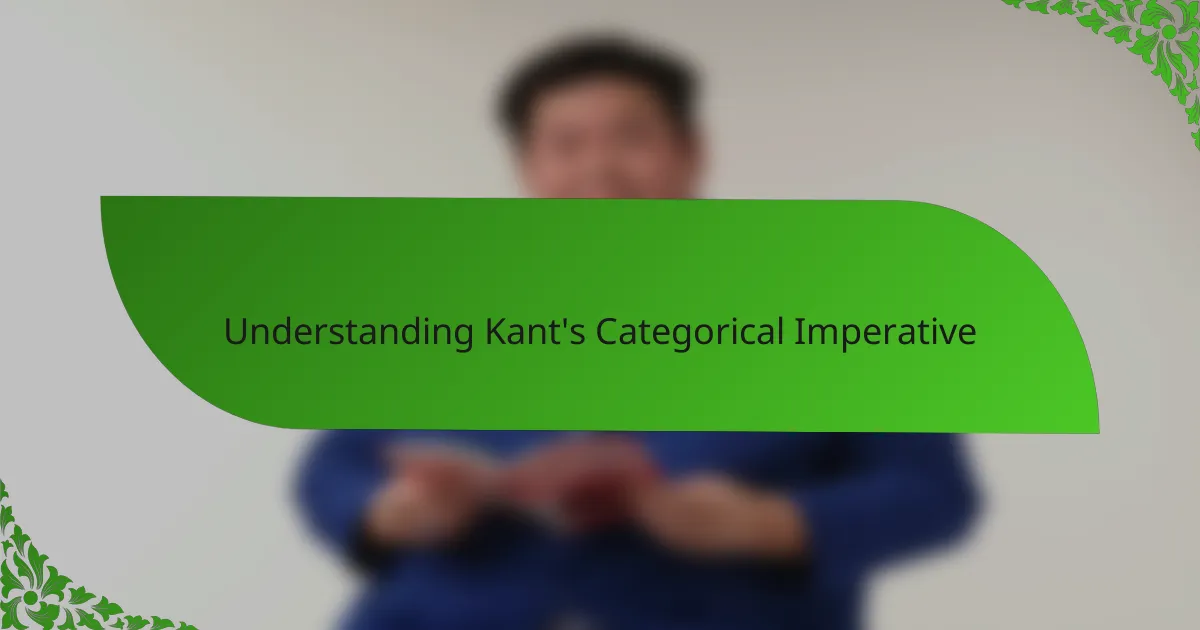
Understanding Kant’s Categorical Imperative
When I first encountered Kant’s Categorical Imperative, I was struck by its clarity and demand for consistency in moral decision-making. It’s essentially a test I apply: Can the rule I’m about to follow be universalized without contradiction? This straightforward question made me rethink everyday choices, pushing me to consider whether my actions could serve as a model for everyone.
One moment stands out when I faced an ethical dilemma at work, tempted to bend a rule to gain a quick advantage. Recalling Kant’s principle, I asked myself, “What if everyone acted this way?” The discomfort that arose convinced me this path wouldn’t hold up universally, which guided me back to integrity. That experience made the abstract concept incredibly tangible and practical in my own life.
Have you ever paused to wonder if your choices could be moral laws for all? That reflection, sparked by understanding the Categorical Imperative, transformed how I approach decisions—no longer as isolated acts but as part of a broader ethical picture. This shift, in my view, is the heart of Kant’s enduring moral insight.
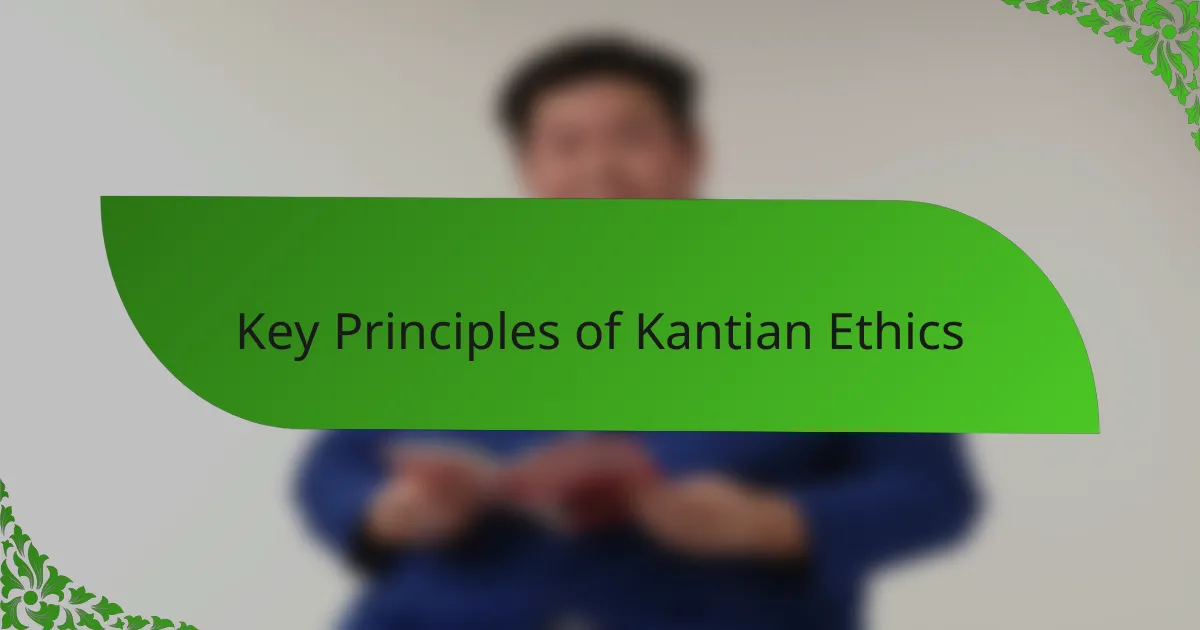
Key Principles of Kantian Ethics
One principle that really resonated with me is the idea of duty for duty’s sake. Kant insists that moral actions aren’t about what we want or what consequences might come, but about doing what’s right because it’s right. When I embraced this, I realized how often I let outcomes cloud my judgment, and shifting to pure duty felt both challenging and surprisingly freeing.
Another key idea is treating people as ends in themselves, never merely as means. This principle made me question how I interact with others daily. Am I respecting their dignity, or am I using them for my own purposes? Reflecting on this uncovered moments where empathy had slipped, pushing me toward deeper respect and genuine connection.
Have you noticed how Kantian ethics demand consistency across situations? This universality principle isn’t just theoretical—it’s a practical guide that asks: can everyone act on this maxim without contradiction? I found this question invaluable, especially when faced with tough choices that tested my integrity beyond personal convenience.
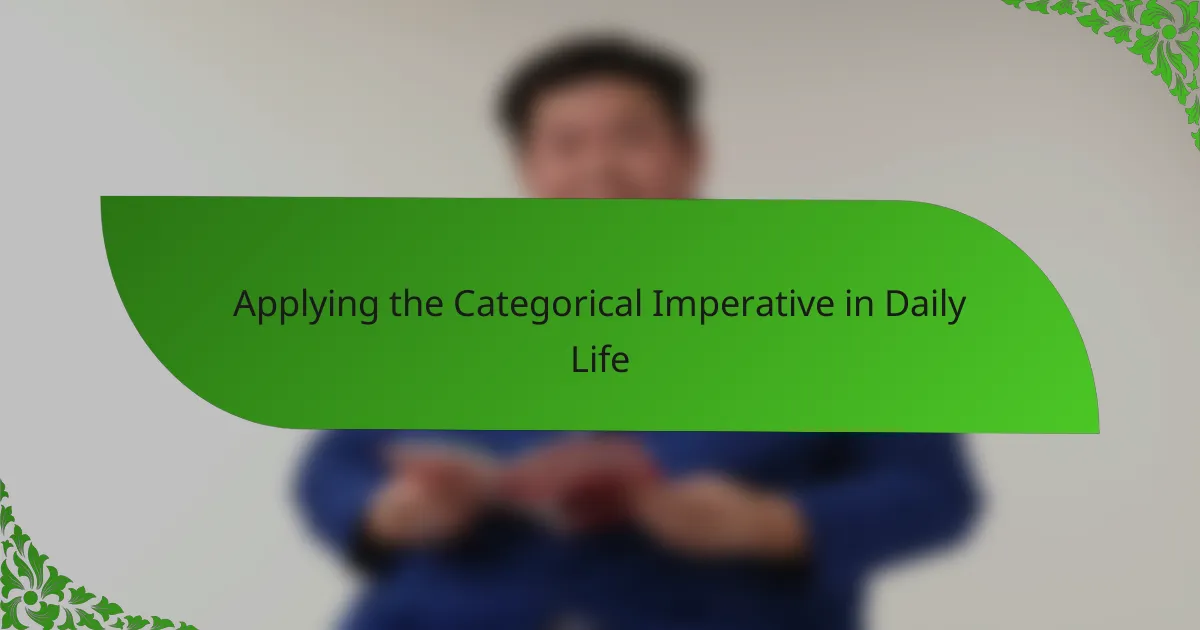
Applying the Categorical Imperative in Daily Life
Applying Kant’s Categorical Imperative in daily life often felt like holding up a mirror to my actions. I remember hesitating before telling a white lie to avoid hurting a friend’s feelings. Asking myself, “Could I want everyone to lie in such situations?” revealed a tension between kindness and honesty that challenged my usual response.
There were times when small decisions—like returning extra change from a cashier’s mistake—became moments of moral clarity. It surprised me how this simple act, viewed through Kant’s lens, wasn’t just about honesty but about endorsing a universal rule of fairness. That realization made ordinary choices feel weightier and deeply meaningful.
Have you ever caught yourself slipping into habits that, if universalized, would erode trust or harm others? I found that this question helped me pause and recalibrate my behavior in subtle but important ways. It’s like having an internal ethicist whispering, “Is this something that should be a law for all?” and that keeps me more accountable than strict rules ever could.
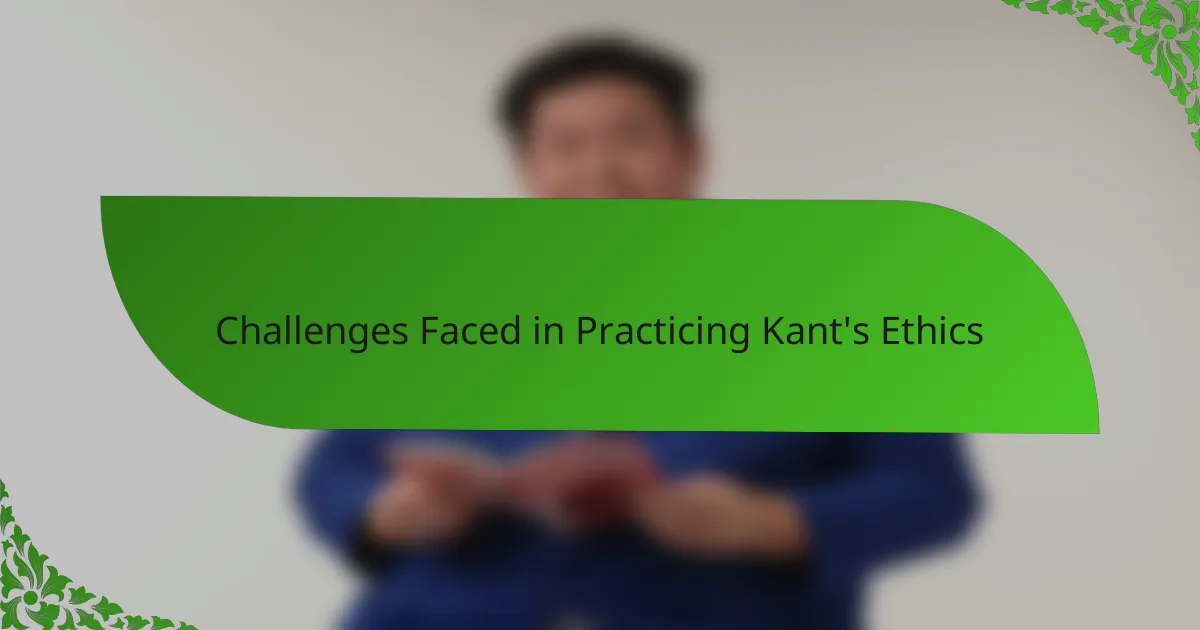
Challenges Faced in Practicing Kant’s Ethics
There were moments when applying Kant’s ethics felt downright frustrating. Like when I struggled to balance honesty with compassion—was telling a harsh truth really the duty I owed, even if it caused pain? That tension made me question whether Kant’s strict rules always fit the messy reality of human relationships.
I also found it challenging that Kant’s framework leaves little room for exceptions based on outcomes. This rigidity sometimes clashed with my intuition, especially in complex situations where consequences matter deeply. Have you ever faced a choice where sticking to duty felt cold or impractical? I certainly have, and it made me realize that living by the Categorical Imperative demands a kind of moral courage that’s easier said than done.
Another hurdle was discerning the universality of some maxims in everyday life. It’s one thing to ask, “Could everyone do this?” but quite another to judge which actions genuinely pass that test. I sometimes caught myself overthinking or doubting whether my maxim could hold up universally, which slowed my decision-making and added unexpected stress. It showed me that practicing Kantian ethics isn’t just about following principles—it’s a continuous exercise in reflection and self-discipline.
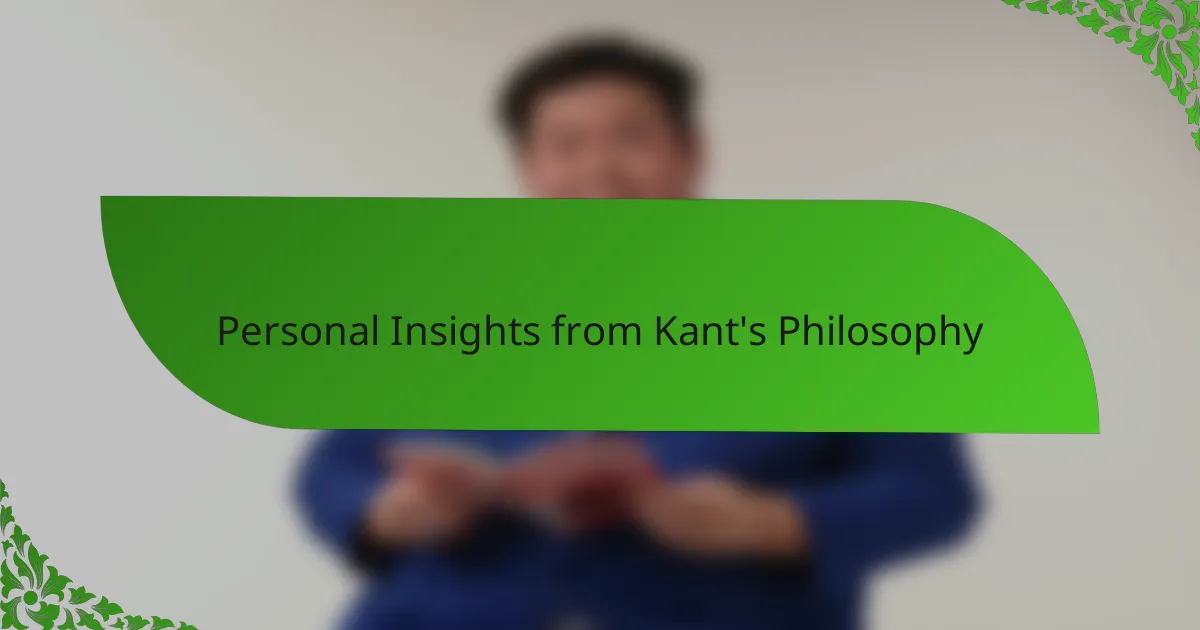
Personal Insights from Kant’s Philosophy
Kant’s notion that moral law must come from within challenged me to look beyond convenient justifications and really own my ethical commitments. I recall a time when this inner demand felt almost burdensome, yet it also brought a strange sense of freedom—knowing that my integrity wasn’t at the mercy of external pressures but rooted in my own reason. Doesn’t that shift in perspective make ethics feel more empowering rather than restrictive?
What struck me most was how Kant’s emphasis on rational consistency pushed me to confront uncomfortable truths about myself. I asked, “Am I truly treating others as ends, or am I slipping into patterns where people become mere stepping stones?” Facing those questions honestly was unsettling, but it opened a pathway to greater empathy and respect that I hadn’t fully appreciated before.
Have you ever realized that living faithfully by a moral principle can sometimes isolate you or set you apart? That tension between belonging and integrity became very real as I navigated Kant’s ideas. Yet, I found that such challenges deepened my self-understanding and strengthened my resolve, revealing how philosophy isn’t just abstract—it’s woven into the fabric of everyday life.
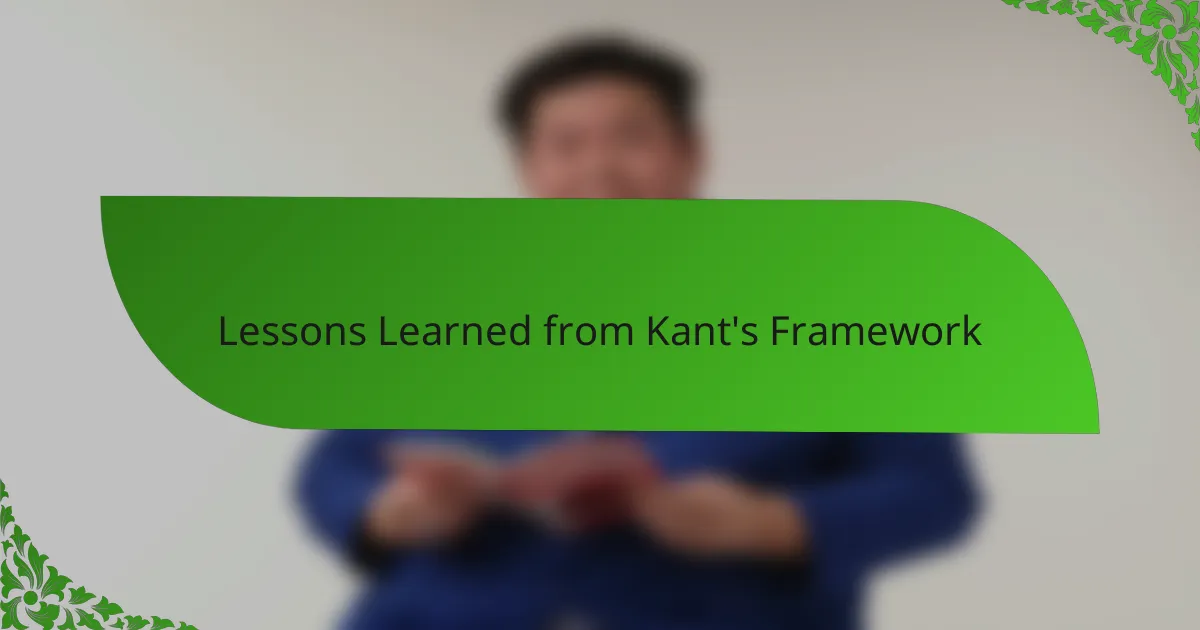
Lessons Learned from Kant’s Framework
Kant’s framework taught me that morality isn’t about shifting circumstances or personal gain but about steadfast principles that hold no matter what. There’s a certain strength in that—knowing that my actions can withstand universal scrutiny—which made me feel more grounded in my ethical choices. Have you ever experienced that reassurance when your decisions align with a consistent moral law?
What really hit home was the lesson on respect for others as ends in themselves. It challenged me to rethink everyday interactions, pushing me to see people beyond mere means to an end. That shift stirred a deeper sense of empathy and responsibility, making me wonder: am I truly honoring the dignity of those around me or just going through the motions?
Yet, embracing Kant’s imperative also revealed how demanding moral consistency can be. It’s not always comfortable or easy, especially when emotions or complexities cloud the situation. I found myself grappling with doubts, but each time, that internal question—“Could this be a universal rule?”—helped me pause and recommit to integrity in ways I hadn’t expected.
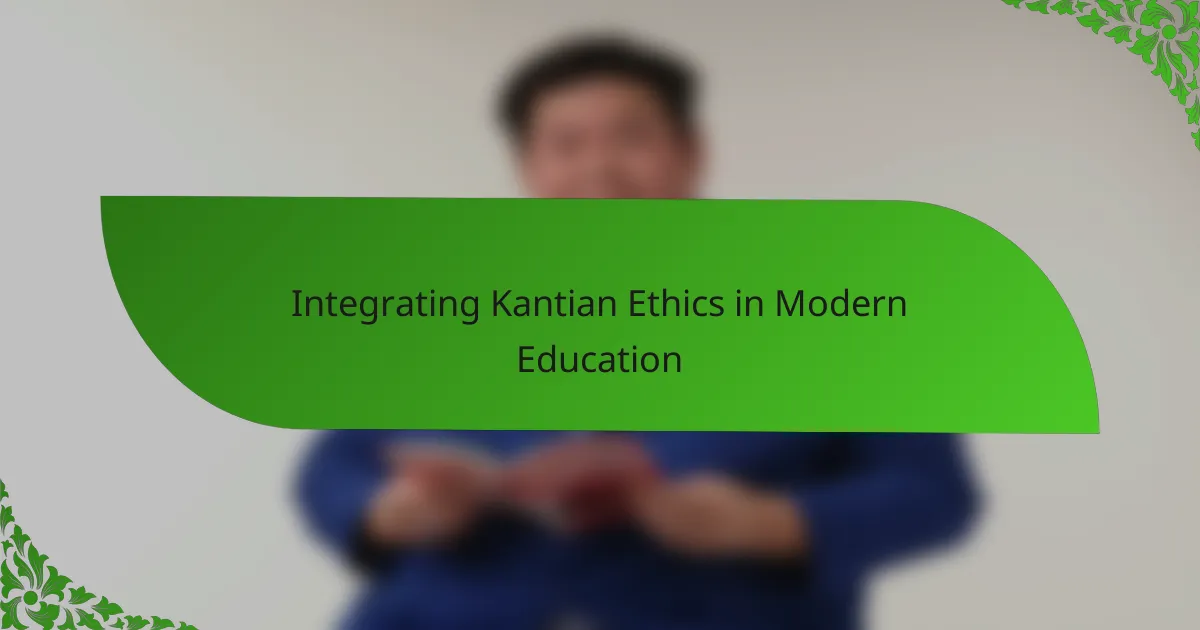
Integrating Kantian Ethics in Modern Education
Integrating Kantian ethics into modern education feels like equipping students not just with knowledge, but with a moral compass that challenges them to think beyond personal gain. I’ve seen how encouraging learners to ask, “Could this action be a universal law?” sparks deeper reflection—transforming abstract philosophy into a practical tool for everyday decisions. It’s more than teaching rules; it’s about fostering a mindset that values consistency and integrity.
One hurdle I’ve noticed in educational settings is balancing Kant’s demand for strict duty with the nuances of real-life situations. When students wrestle with tough ethical dilemmas, prompting them to consider duty “for duty’s sake” often leads to rich discussions about responsibility versus consequence. That tension, I believe, is where true ethical growth begins—not in easy answers but in grappling with complexity.
Have you ever wondered how we might help young people respect others as ends, not means? In classrooms where empathy and human dignity are emphasized alongside Kant’s principles, I’ve witnessed a subtle but powerful shift. Students start to see their classmates—and themselves—through a lens of mutual respect, making ethics feel less like abstract theory and more like a lived commitment. This, to me, is the heart of integrating Kantian ethics meaningfully in education today.